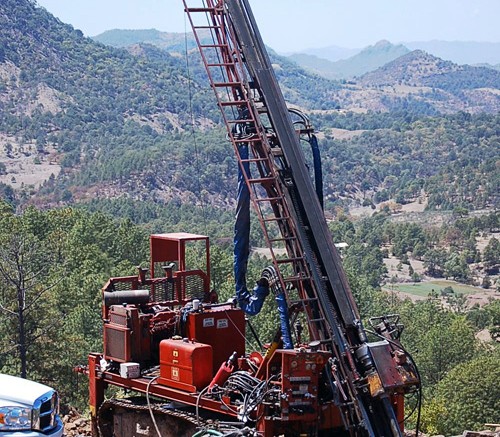It has taken eight years, but Paramount Gold and Silver (PZG-T, PZG-X) CEO Christopher Crupi says the company’s San Miguel project in northern Mexico, about 300 km southeast of Hermosillo, has been well worth the wait.
“It’s been a long road,” Crupi says in a telephone interview from Ottawa, but “a fun road.”
And with the preliminary economic assessment now released, which takes some of the risk out of the project and demonstrates solid economics, the junior stands out among many of its peers, he says.
“It’s not that common for junior companies to go from discovery to having something quantifiable in the ground that you can put numbers around,” he says.
The gold and silver project could be mined by open-pit and underground methods, and produce a total of 803,000 oz. gold and 43.2 million oz. silver over its 14-year mine life.
Start-up capital costs, including working capital, are estimated at US$243 million. Sustaining capital costs over the project’s life are projected to add another US$227 million. With another US$70.3 million in contingencies, total life-of-mine capital costs are forecast to reach US$540 million.
At US$1,500 per oz. gold and US$29 per oz. silver — the three-year trailing average of gold and silver prices at the end of January — San Miguel has an estimated US$1.1 billion in pre-tax net cash flow, a US$707-million pre-tax net present value (NPV) at a 5% discount rate and a pre-tax internal rate of return (IRR) of 33.2%. (The company could not provide post-tax NPV and IRR numbers before press time.)
Paramount envisions five different mines at the project that would feed a central mill. Of the five mines, two would be open pits and three would be underground.
Crupi adds that two of the three underground mines would be mined by underground and open-pit methods. Four of the proposed mines would be within 4 km of the central processing plant, with the fifth 8 to 10 km away.
“We’ll get economies of scope, and we’ll be able to run this mill at its maximum, because we’re going to be running [the mines] independently,” he says. “So it’s low capital expenditure to build one facility.”
Crupi says the company will start with the open pits and move underground once it develops cash flow. The company will mine mostly silver first, and move onto gold as it proceeds. He also notes that while there will be some infrastructure to build, there won’t be much — the Mexican government has already brought in power, and Paramount has its own wells and water rights. And with its property surrounding the land on which Coeur d’Alene Mines (CDM-T, CDE-N) built its Palmarejo mine, there is also a network of roads that it can access.
The mining district has attracted other heavyweights as well. Goldcorp’s (G-T, GG-N) El Sauzal mine is 65 km southeast of San Miguel, and the Mulatos mine owned by Alamos Gold (AGI-T, AGI-N) is 130 km to the north.
“It’s a low-cost project, relatively speaking, and in these environments where markets aren’t liquid, it’s better to have a low-cost project you can get into production faster, and that you can fund as you go, as opposed to raising large amounts of money, which in some cases can strangle you if the project timeline slips or costs overrun,” Crupi says.
Crupi believes the company will have enough funds to complete a feasibility study on the project within the next 18 months. Paramount has $10 million in cash and will have $8 million of warrants coming back to the company in March. The warrants are held by hedge-fund manager Albert Friedberg, a commodities trader and founder of the Friedberg Mercantile Group in Toronto. Forbes magazine named Friedberg among the top-40, highest-earning hedge-fund managers in 2011.
Friedberg, Crupi and the company’s board of directors collectively own 30% of Paramount’s shares.
San Miguel has a measured-and-indicated open-pit resource of 4.89 million tonnes grading 122 grams silver per tonne for 19.19 million contained oz. silver and 0.39 gram gold, for 62,000 contained oz. gold.
Its open-pit inferred resource stands at 4.74 million tonnes grading 80 grams silver per tonne for 12.25 million contained oz. silver and 0.37 gram gold, for 57,000 contained oz. gold.
Underground resources in the measured-and-indicated category are 4.94 million tonnes grading 112 grams silver for 17.78 million oz. silver, and 2.60 grams gold for 412,000 contained oz. gold. The project’s inferred underground resource is 3.92 million tonnes grading 102 grams silver for 12.87 million contained oz. silver and 2.61 grams gold for 329,000 contained oz. gold.
Adam Graf of Dahlman Rose & Co. in New York says that the PEA demonstrates “positive returns on capital and solid project fundamentals.” He has a “buy” rating on the stock, with a price target of US$11.73 per share. At press time in New York, Paramount was trading at US$2.03 per share within a 52-week range of US$1.89 to $2.82.


Be the first to comment on "San Miguel begs to be built"